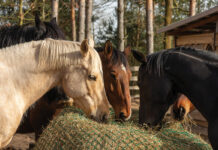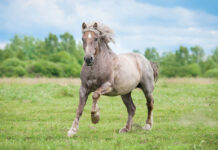Cantharidin, the highly toxic substance found in blister beetles, can cause severe complications and death if ingested by your horse. Blister beetles swarm in alfalfa fields and can accidentally end up in hay bales. The best way to avoid the deadly pests is to check your hay for their presence—dead or alive. Blister beetle poisoning is a red-alert emergency and requires immediate veterinary care. Signs that your horse may be suffering from blister beetle toxicity include:
• Salivation (usually due to blisters)
• Goes off feed
• Increased heart and respiratory rates
• Sweating
• Fever
• Colic
• Diarrhea
• Endotoxic shock (indicated by discolored gums)
• Blood in manure or urine
• Thumps (referred to as synchronous diaphragmatic flutter; can look like hiccups)






This article was very informative and timly. I would like to see a picture or two of the beetle though.
That’s scary…
My horse started drooling about a week ago. The next day while eating his grain he was chewing funny. Over the next couple of days he would eat his grain sort of but kind of seemed like his lips were numb and had a hard time getting it. The drooling continued but seemed to lessen. Two nights ago wasn’t intested in his grain at all. Last night he was just not right, wouldn’t eat and now you could see bloody drool. I tried to look at his mouth and teeth, but I’m no vet, everything seems a bit swollen. This whole week he has also been in the pasture so I figure he is eating. The vet came out this morning and he thinks it is blister beetles causing his troubles. His tounge looks like a blistered rotting piece of meat. Any ideas in adition to what the vet has said would be greatly appreciated.
It great to look and know what the signs are. Is theere any area, that has more beetles than another. I will read up on this more.
I wish there was more about how many different kinds there are and the differing poison levels in the different beetles.
Another issue for me to worry about.
I have noticed an increase over the past several years of various beetle type insects in my barn, concurrent with my use of alfalfa or alfalfa mixes for my horses with ulcers. So far no horse has exhibited signs and symptoms. How prevalent are blister beetles on MD’s Eastern Shore, and what can I do to prevent importing them to my farm?
I appreciate this information. But it would be very helpful to have even more. In which states are they most prevalent? What is the recommended veterinary course of treatment (in case our local vets don’t know)?